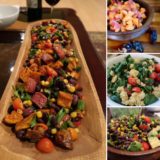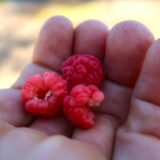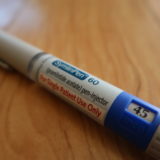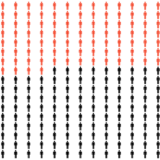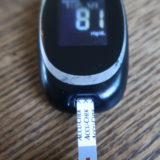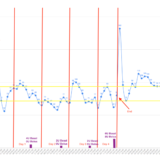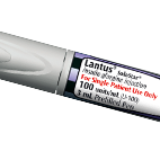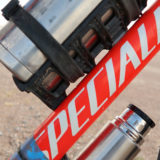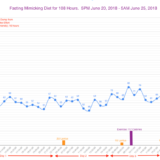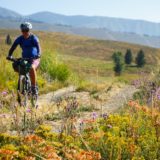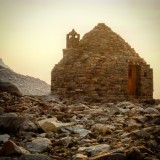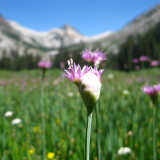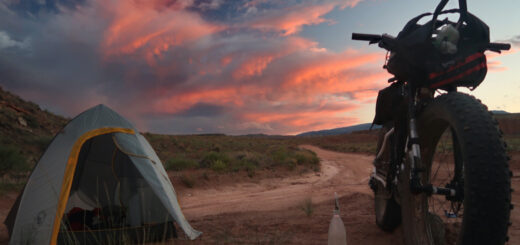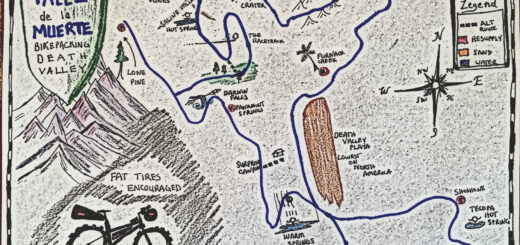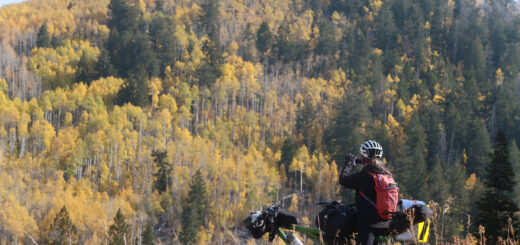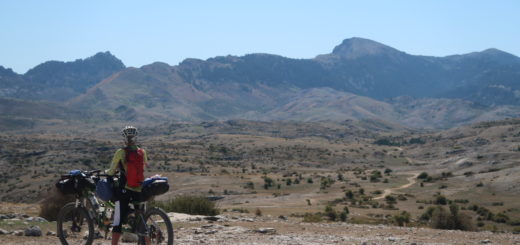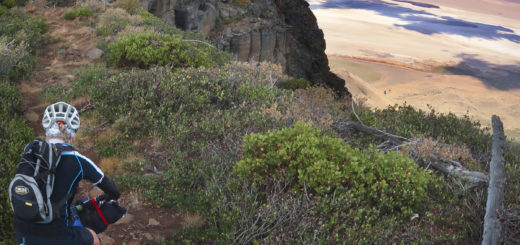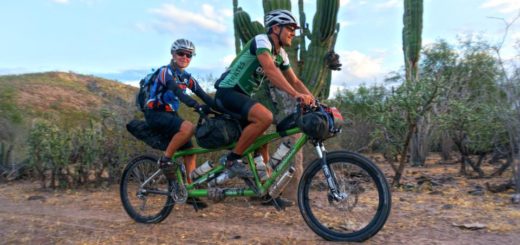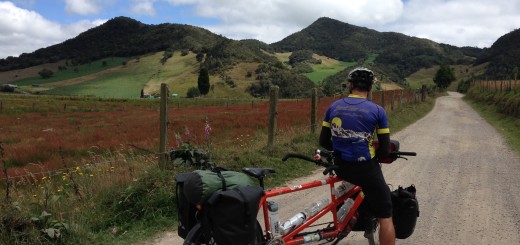01/26/2024 Bikepacking The Ivory Coast Day 171 : Kong
Kong impressed me. I rolled in relatively early with the plan of taking a half-rest day. Everywhere, women were sweeping the streets with crafted brooms made from sticks and grasses bunched together. They had to lean over, because there was no broomstick. Presumably that lumber had been put to other uses such as cooking or food mashing.
If your had been teleported straight from the US, your initial reaction might be to exclaim, “this place is dirty!” But for me, it felt clean. Most importantly, though, I had a sense that people actually cared. Kong gets an “A” for effort because caring goes a long way towards a better Africa.
Hoping that I could procure some chain lube in a larger village, I went around to the motorcycle shops showing my white wax lubricant as an example. As in the other villages, this caused people to laugh amongst themselves.
“But what do you use here for the motorcycle chains?” I asked. These motorcycles have to contend with the same bug-dust as me, yet their chains appeared clean and never noisy.
A kid ran over to grab a beat up, plastic quart bottle of motor oil. He dropped out a few black drips: Used oil from the crankcase is recycled into motorcycle chain lube.
I said “no thanks.” Then they asked if I wanted “new.” They took me to a glass bottle that had a tiny puddle of clean motor oil at the bottom.
“No thanks.”
This is all these guys have to work with. I was a little embarrassed to be prancing around with my "princess-and-the-pea" chain lube.
It’s the same story in every village. By the way, along this route at least, motorcycle repair shops outnumber any other type of business.
******
I had decided to visit Kong because of its UNESCO world-heritage mud mosque. You are allowed to enter, and even though I’ve been in Muslim territory for nearly 90 days now, I’ve yet to enter a mosque. I went inside, snapped a photo, and left. With all the time I have spent amongst Muslims now, it is clear to me that the physical building is the least important part of Islam.
******
After a week of being unimpressed with Ivory Coast, the country did an about-face today. I met several kind and generous people; it was reminiscent of the time spent in Morocco or Mauritania where I’d be constantly invited to tea. In fact, I was given water (in bags) for free… twice today. I insisted on paying; they insisted harder, which only made me want to tip them more. In the end, these nice conversations always end abruptly with the men running off. They have to go pray. If you haven’t figured it out by now, the Muslim people have impressed me. The men talk softly and gently. Seeing a mosque in a village is a good sign, except that it means that God can interrupt you at any moment. Well, at least he has a well defined schedule.
******
Later, I’d meet Coulibaly Yacou. Luckily, I got him to type out his name. I knew he was a good guy because he started showing me photos of his “little” brothers. One lives in France with his (white and French) girlfriend. The other lives in Italy.
“I am going to go to Algeria for work,” he said.
I saw that he had already built two little businesses in the tiny village. A micro-cafe, and a humble cell phone shop.
When I asked him about his businesses, he said, “There isn’t enough money. Little by little”
He didn’t have too much inventory, but I knew he could keep growing his businesses like other people have.
Then he said, “I’m going to go through Mali to get to Algeria.”
Ugh. My heart sank. Here is this ambitious, smiling young man, and I have the story that Foday in Sierra Leone had told me fresh in my mind. (You may remember Foday from episode 156. His friend had been killed in Mali, as terrorist kidnappings for ransom are increasingly common there).
“Isn’t Mali dangerous?” I asked.
“No.”
I didn’t want to be the Negative Nancy to his dream… but I worried. I asked him one more time if he thought it was dangerous… but in the end kept silent on Foday’s story.
We changed the subject to my wife and why she isn’t here. I told them she didn’t want to come because Africa is difficult. He asked, “Is Africa difficult?”
I said, “it is..." but then a little surprisingly, I couldn’t think of anything else to say. Being an introvert, it is sometimes challenging to handle so many “kill you with kindness” interactions at once… but how could I explain that to him? He lives here. It is difficult having such a limited selection of food, but again… not something I wanted to mention for obvious reasons.
He must have read my mind: “The food here is good, no?”
I pointed to my bike where I had packed the 3 rolls of cookies I had just bought from him… These were the only “calories” he had for sale. All 3 of them laughed before I explained that is all I eat. Coulibaly ran behind the shack and came back with one of those huge yams, the dirt clods still sticking to it.
“Is that good?” I asked
“Yes! Very good!”
From the looks of it, the people in this region practically subsist on mashed yams. At least at this time of year.
Yeah, I can’t rightly tell someone here that Africa is difficult for me.
******
This morning, I came across another roped barrier, and from a distance I could see a woman and her motorcycle driver being detained. Her arm was outstretched with some money.
I slowed down, hoping I could figure this out. The guards were not taking the money. I crept along, finally arriving at the rope. They quickly let it down for me, and once I passed, they pulled it back up. Slowly I watched in my mirror as the woman continued to attempt to give the soldiers the money. This continued until I could no longer see them. I’m sticking to my theory from episode 169 that some people are being blocked from travel based on their ethnicity.
If your had been teleported straight from the US, your initial reaction might be to exclaim, “this place is dirty!” But for me, it felt clean. Most importantly, though, I had a sense that people actually cared. Kong gets an “A” for effort because caring goes a long way towards a better Africa.
Hoping that I could procure some chain lube in a larger village, I went around to the motorcycle shops showing my white wax lubricant as an example. As in the other villages, this caused people to laugh amongst themselves.
“But what do you use here for the motorcycle chains?” I asked. These motorcycles have to contend with the same bug-dust as me, yet their chains appeared clean and never noisy.
A kid ran over to grab a beat up, plastic quart bottle of motor oil. He dropped out a few black drips: Used oil from the crankcase is recycled into motorcycle chain lube.
I said “no thanks.” Then they asked if I wanted “new.” They took me to a glass bottle that had a tiny puddle of clean motor oil at the bottom.
“No thanks.”
This is all these guys have to work with. I was a little embarrassed to be prancing around with my "princess-and-the-pea" chain lube.
It’s the same story in every village. By the way, along this route at least, motorcycle repair shops outnumber any other type of business.
******
I had decided to visit Kong because of its UNESCO world-heritage mud mosque. You are allowed to enter, and even though I’ve been in Muslim territory for nearly 90 days now, I’ve yet to enter a mosque. I went inside, snapped a photo, and left. With all the time I have spent amongst Muslims now, it is clear to me that the physical building is the least important part of Islam.
******
After a week of being unimpressed with Ivory Coast, the country did an about-face today. I met several kind and generous people; it was reminiscent of the time spent in Morocco or Mauritania where I’d be constantly invited to tea. In fact, I was given water (in bags) for free… twice today. I insisted on paying; they insisted harder, which only made me want to tip them more. In the end, these nice conversations always end abruptly with the men running off. They have to go pray. If you haven’t figured it out by now, the Muslim people have impressed me. The men talk softly and gently. Seeing a mosque in a village is a good sign, except that it means that God can interrupt you at any moment. Well, at least he has a well defined schedule.
******
Later, I’d meet Coulibaly Yacou. Luckily, I got him to type out his name. I knew he was a good guy because he started showing me photos of his “little” brothers. One lives in France with his (white and French) girlfriend. The other lives in Italy.
“I am going to go to Algeria for work,” he said.
I saw that he had already built two little businesses in the tiny village. A micro-cafe, and a humble cell phone shop.
When I asked him about his businesses, he said, “There isn’t enough money. Little by little”
He didn’t have too much inventory, but I knew he could keep growing his businesses like other people have.
Then he said, “I’m going to go through Mali to get to Algeria.”
Ugh. My heart sank. Here is this ambitious, smiling young man, and I have the story that Foday in Sierra Leone had told me fresh in my mind. (You may remember Foday from episode 156. His friend had been killed in Mali, as terrorist kidnappings for ransom are increasingly common there).
“Isn’t Mali dangerous?” I asked.
“No.”
I didn’t want to be the Negative Nancy to his dream… but I worried. I asked him one more time if he thought it was dangerous… but in the end kept silent on Foday’s story.
We changed the subject to my wife and why she isn’t here. I told them she didn’t want to come because Africa is difficult. He asked, “Is Africa difficult?”
I said, “it is..." but then a little surprisingly, I couldn’t think of anything else to say. Being an introvert, it is sometimes challenging to handle so many “kill you with kindness” interactions at once… but how could I explain that to him? He lives here. It is difficult having such a limited selection of food, but again… not something I wanted to mention for obvious reasons.
He must have read my mind: “The food here is good, no?”
I pointed to my bike where I had packed the 3 rolls of cookies I had just bought from him… These were the only “calories” he had for sale. All 3 of them laughed before I explained that is all I eat. Coulibaly ran behind the shack and came back with one of those huge yams, the dirt clods still sticking to it.
“Is that good?” I asked
“Yes! Very good!”
From the looks of it, the people in this region practically subsist on mashed yams. At least at this time of year.
Yeah, I can’t rightly tell someone here that Africa is difficult for me.
******
This morning, I came across another roped barrier, and from a distance I could see a woman and her motorcycle driver being detained. Her arm was outstretched with some money.
I slowed down, hoping I could figure this out. The guards were not taking the money. I crept along, finally arriving at the rope. They quickly let it down for me, and once I passed, they pulled it back up. Slowly I watched in my mirror as the woman continued to attempt to give the soldiers the money. This continued until I could no longer see them. I’m sticking to my theory from episode 169 that some people are being blocked from travel based on their ethnicity.
Photos:

Sunrise at camp.

This camera is old, and Africa has taken a toll like no other trip. A recalcitrant shutter button, grinding as the lens extends, and behind the lens, it is covered with dust. A full overhaul will be needed at home.

—
A Typical morning.

Not sure what happened here. By the way, it’s pretty certain now that I broke a rib in that wipeout back in Guinea. Oddly, I didn’t have pain right after the crash, but it has been hurting a lot ever since. Trying to sleep on that side is painful. Every day I have to ride carefully because the deep sand constantly wants to catch your tire and take you down.
—

From (that is really a website):
The mosque of Kong, of neo-Sudanese style constitutes the oldest symbol of the Islamization of the people of the North of the Ivory Coast. It has retained its function as a place of prayer and gathering.
Around 1897, Samory Touré burned the Grand Mosque to keep it out of the hands of the French; the mosque eventually underwent reconstruction and served as a symbol of his resistance to colonialism.
Its architecture, which has remained intact for a long time due to regular maintenance, has however undergone, in 1978, an inappropriate restoration that has somewhat destructured the building.
It was also declared a UNESCO World Heritage Site in 2021.


Che Guevara is an icon in many Latin American countries, so it’s a surprise to periodically see his visage here in Africa. Apparently, Africa had their own version of “Che”… named “Thomas Sankara”
…

He said is name was Ouattara… “like the president.” And that is how I learned the name of the president of Ivory Coast.
🇨🇮



I haven’t seen much corn growing, so it was a bit of a surprise to see this pile of corncobs. A goat picks through the remnants.
—


On the left is Coulibaly Yacou. Please don’t go to Mali!
—

Inside the clay mosque. The floor is sand. Just to test, I made that little dimple in the right side photo.
—


Tonight’s campsite. That is the moon rising. It’s a hand-held “long” exposure. Tent is illuminated with my flashlight on a blue water bottle. Moon is red thanks to the African dust and all the burning going on. AQI here is often over 150.
—


All my gear is dying after half a year. Luckily I still have the UV purifier - so I can treat well water. Surface water is no longer an option, though, because the physical filter died. Today, air just goes straight through the filter.
—

Another thing that died was my rear hydraulics. I let a girl ride my bike in Sierra Leone, and she crashed it. Since then, the lever has been leaking. I took a can of sardines and filtered the water and oil. Then I used an insulin syringe to separate suck up the supernatant. After cutting off the needle, I discovered that the soft plastic threads PERFECTLY into the bleed port of the lever! It sealed, and I was able to fix the hydraulics. The brake stopped working yesterday, but now it is as good as new! Looks like diabetes and sardines both have a good side.
—

Another gear fail (my fault) is setting up the tent on top of these holes in the ground. Now I have carbon copy holes in the bottom of the tent! Wonder what critter that was.
—
Strava Comments:
Braden L.
Boy riding your bike photo is the best!
Braden L.
Genius brake repair
Janet W.
So many things happen that I don’t hear about on the phone. I’m impressed you can keep riding so far each day with a very sore rib. Your arm looks like dry skin peeling. I hope that’s all it is. I’m glad Africa is not hard! The people you talked to today have dreams and are working towards them.
Dean G.
Brian (MacGyver) Lucido
Dan L.
Impressive! I’m just gonna use sardine oil to bleed my brakes from now on!
The used motorcycle oil for your chain wouldn’t have been bad - we used olive oil on the OTT, and my regular chain oil is bar and chain oil for chainsaws.
Charley H.
The sardine-hydraulic fix was clever. You get a gold ⭐️ and a 🙂 on your report card. Keep up the good work.
evan F.
I have also used unapproved oil for brake repair. I managed to get Shimano road brakes working better with some random oil I found. Now I carry a small syringe and some mineral oil on trips...
terri W.
Another day of interesting interactions and photos. The look of the boy riding your bike is just amazing! Love the simplicity of life albeit so poor. It’s enjoying life in its purest form with the best they can do. Education would probably be a great addition to their prosperity.
Ann L.
I’ve heard that in general most Muslims are gentle, peace and God loving people. Nice to hear you’ve found the same in your experience. I sure hope your friend Coulibaly Yacou does ok in Algeria. The skin on your arm looks like maybe peeling from sunburn?
It must be hard to ride that many miles with a broken rib!
Vicki C.
Not just bees that become “africanized” but you too:) Using what you have, you keep patching everything together. You are leaving nothing on the table so when you get home- no regrets! But also to balance the equation, your kindness and thoughtfulness has brought joy to so many people❤️
Mark G.
Are you able to find fish for eating. Amazing McGyvering btw
Brian L.
Mark Glenesk - i eat fish every day (sardines from a can). However, today I saw a guy cutting up a frozen fish - a very rare sight inland (which is why I took a photo). He used the knife and cut it using a hammering action (because it was frozen so hard). I didn’t bring a stove, though, and sardines are much more portable and easier to find.
Ride Stats:
| Elapsed Time | Moving Time | Distance | Average Speed | Max Speed | Elevation Gain | Calories Burned |
|---|---|---|---|---|---|---|
|
11:18:56
hours
|
07:33:45
hours
|
133.08
km
|
17.60
km/h
|
63.00
km/h
|
937.00
meters
|
2,693
kcal
|







